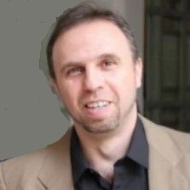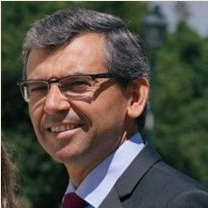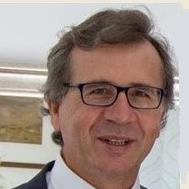From Dogmatism to a Public Theology: An Archeology of Theological Knowledge and Religious Studies
A special issue of Religions (ISSN 2077-1444). This special issue belongs to the section "Religions and Theologies".
Deadline for manuscript submissions: closed (1 April 2024) | Viewed by 7431
Special Issue Editors
Interests: systematic theology; theological epistemology; theology and literature; ancient Christian authors and classical studies; complexity; common home issues; public theology; archaeology of theo-logical knowledge
Special Issues, Collections and Topics in MDPI journals
Interests: political theology; religion and political philosophy; postmodernity; religion and digital culture; religion and philosophical phenomenology
Interests: christianity and ancient world; patristics; early Christian literature; Christian origins; Saint Augustin; gnosticism; archeaolgy of theological knowledge
Special Issue Information
Dear Colleagues,
The premise of the German jurist, Carl Schmitt, that modern political concepts are understood as a secularized expression of theology and his attempt of support the Nazi «total State» was directly related to Hitler's statement as: “I believe today that I am acting in the sense of the Almighty Creator: By warding off the Jews I am fighting for the Lord's work” (Mein Kampf, 1925). With the arrival of the Führer as the salvation from the Weimar Republic’s crisis, two perspectives prevail: the establishment of a state of exception as a kind of divine intervention to maintain the order; the formulation of a Sovereignty of the State as a secularization of papal infallibility in the Church, in which, in the face of the crisis, «uniformization» (Gleichschaltung) was necessary as a power structure that eliminate all types of dissonant expression. On the one hand, it does not seem to be a coincidence that groups with authoritarian discourses still claim such a divine mandate in contemporary times. Thus comes the perception of insufficiency of the secularization hermeneutics aiming to guarantee the noble ideal of secularism as protecting public order and safeguarding individual freedom of conscience, limiting them to the private sphere. However, within the framework of typical recomposition of post-secular societies, the scope of certain political projects get support through a religious self-referentiality explored as an immunizing element in the contexts of critical debate typical of the public sphere. The emergence of a “public religion”, in these circumstances, may not help to build a common project, shared by a pluralistic society, but becomes an instrument for the political strengthening of identity blocks. On the other hand, simultaneously, there is the emergence of counter-hegemonical plural political theological hermeneutics, committed to a public agenda within the religious traditions, such as the contextual theologies and currently some world religious leaders who have committed to the 2030 Agenda, to the point of being recognized by some UN analysts as a “spiritual” sector, viewed as a possible source of wisdom, valid for building consensus about life in common. Nonetheless, the incorporation of a public agenda in the religious realm by itself is still insufficient to contain the growth of extremist groups in democratic societies with religious support. To this end, this Special Issue aims to collect contributions from the interlocution of three archaeological projects, , namely those of Michel Foucault, Michel de Certeau and Giorgio Agamben, that focus on the tension between this theological self-referentiality and the emergence of an public rationality, as a way to: a) offering more complex analysis tools for the question of the reemerging of the political theological discourse in post-secular societies; b) establishing an epistemological critique of theological self-referentiality, mapping its modern forms; c) analyzing, using an expression by De Certeau, how the change of perspective in religious traditions operates like a Trojan horse that re-signifies theological structures from an ethical sensitivity to new dilemmas from a plurality of resistance tactics.
We look forward to receiving your contributions.
Prof. Dr. Alex Villas Boas
Prof. Dr. João Duque
Prof. Dr. Isidro Lamelas
Guest Editors
Manuscript Submission Information
Manuscripts should be submitted online at www.mdpi.com by registering and logging in to this website. Once you are registered, click here to go to the submission form. Manuscripts can be submitted until the deadline. All submissions that pass pre-check are peer-reviewed. Accepted papers will be published continuously in the journal (as soon as accepted) and will be listed together on the special issue website. Research articles, review articles as well as short communications are invited. For planned papers, a title and short abstract (about 100 words) can be sent to the Editorial Office for announcement on this website.
Submitted manuscripts should not have been published previously, nor be under consideration for publication elsewhere (except conference proceedings papers). All manuscripts are thoroughly refereed through a double-blind peer-review process. A guide for authors and other relevant information for submission of manuscripts is available on the Instructions for Authors page. Religions is an international peer-reviewed open access monthly journal published by MDPI.
Please visit the Instructions for Authors page before submitting a manuscript. The Article Processing Charge (APC) for publication in this open access journal is 1800 CHF (Swiss Francs). Submitted papers should be well formatted and use good English. Authors may use MDPI's English editing service prior to publication or during author revisions.
Keywords
- archaeology of theological knowledge
- Michel de Certeau
- public theology
- public rationality
- Michel Foucault
- Giorgio Agamben
- religion and public agenda
- public ethics
- heterologies







